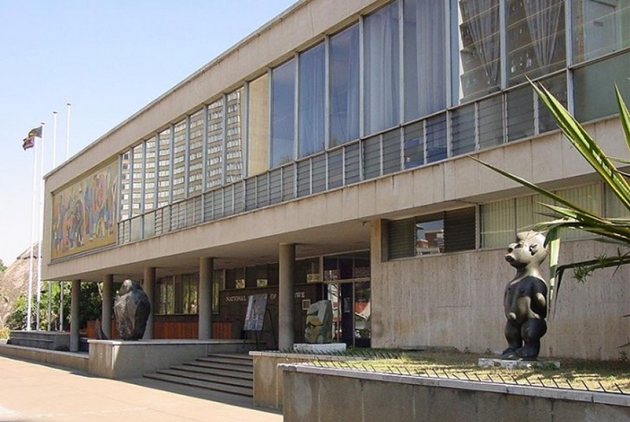France bows to pressure, cancels Zim elephant deal

Jeffrey Gogo Climate Story
FRANCE has cancelled plans to buy up to 20 live elephants from Zimbabwe, as the EuroZone’s second biggest economy succumbed to pressure from global animal rights groups, French authorities have said.
Zimbabwe plans to dispose of over 40,000 “excess” elephants, according to Government, but this has drawn worldwide condemnation.
Wildlife conservationists want the sales halted citing cruelty to animals. Depending on age, each animal fetches between $40,000 and $60,000.
French Minister for Ecology, Sustainable Development and Energy, Segolene Royal told a meeting of nearly 40 NGOs in Paris on January 28 that “France would receive no elephant in Zimbabwe as had been suggested by the authorities of that country,” according to French website, Boursier.com.
A week earlier, the non-governmental organisations, led by the International Fund for Animal Welfare, petitioned the French government to boycott the Zimbabwean elephants arguing the trade was illegal and that it traumatises “an intelligent animal.”
Here at home, the Zimbabwe Conservation Task Force led by Johnny Rodriguez has been ramping domestic and international support against the country’s planned or in progress live elephant exports.
The Parks and Wildlife Authority of Zimbabwe was not immediately available to comment.
However, the Authority’s director for conservation, Mr Geoffreys Matipano told Bloomberg in December that talks had opened with unnamed buyers from France for the sale of between 15 and 20 live elephants. China was negotiating for 27 animals and the United Arab Emirates 15.
Official statistics put Zimbabwe’s elephant herd at 80,000, half of these concentrated in the Hwange National Park, which has an elephant holding capacity of 15,000.
Environment Minister Saviour Kasukuwere has told the Press the herd is twice as much the country can accommodate and support.
He accused the excess herd of destroying biodiversity and crops, and of escalating competition for natural resources such as water and forage with humans, as well as with domestic animals. Now, what is the potential impact of France’s withdrawal on Zimbabwe’s future live elephant trade?
When the French Ecology minister Segolene confirmed to the NGOs the cancellation of the Zimbabwe live elephant imports, she also announced France’s banning of raw ivory exports, promising to influence fellow EU members to impose similar bans.
If the country was hoping to secure more European buyers, that market is now seriously compromised, unless some miracle happens, which is unlikely.
The French wield some substantial power within the EU, and are sufficiently capable of influencing key decisions against Zimbabwe’s favour, if they choose to do so, which choice has since been made.
This influence may not immediately expand to infiltrate systems at CITES, the global watchdog for endangered animal species.
But France’s reaction should now be viewed as a precursor or the first steps towards a future complete or controlled ban of live elephant trade at the CITES level.
Secondly, the French cancellation will unfortunately be booked as an important victory for wildlife conservationists who have been unrelenting in their anti-Zimbabwe elephant campaigns.
Governments can be reckless. Organisations such as the ZCTF are crucial for keeping governments accountable, transparent and humane.
But animal rights groups should play this role in a reasonably acceptable manner.
So far on Zimbabwe’s live elephants trade, they are not.
After France, there is undeniable guarantee the ‘boycott Zimbabwean elephants’ crusade will become much stronger, and sensing more victories, greatly determined than ever before.
It will be interesting to see how the Parks and Wildlife Authority handles this spanner that has been thrown into its important conservation plans.
Yamamoto illusion
Ken Yamamoto, a fierce critic of the Zimbabwe Government writing for the website Newzimbabwe.com, last week drew unreasonable parallels between Zimbabwe’s live elephant sales and that of Esau, the Biblical twin cheated of his birthright over a bowl of soup by his younger brother, Jacob.
Yamamoto, being Japanese, a cacophony society of predominant non-Christian believers, clearly misunderstood Jacob’s pre-determined deceptive intent in the birthright transaction. By selling its surplus herd, Zimbabwe is certainly not “selling its birthright,” as asserted by Yamamoto.
The Rudd Concession fits that bill perfectly well.
Moreover, Esau did not sell his birthright. He was cheated of it by a calculating sibling taking advantage of his brother’s desperate hunger. Yamamoto calls that “clever.” Who would do that to their blood brother?
Eventually, God had to change Jacob’s name, which means “deceiver,” to a more suitable one Israel, meaning “contender with God.”
It is notoriously misleading for anyone to try and reduce Zimbabwe’s live elephants trade to the birthright selling charade.
It should be repeated, Zimbabwe possesses the right from birth to manage its nature-given resources in a manner that is ecologically, socially and economically sustainable.
There is no point in keeping elephants or any other animal species at levels that cannot be supported by the country’s severely limited finances and pressured ecosystems.
As one reader put it, “sustainability means you keep the animals at levels that are manageable now and in future.”
If Zimbabwe was indeed selling its birthright, then who is the deceiver?
Yamamoto argues elephant exports will in the long-run be damaging to Zimbabwe’s tourism, as tourists will have the option to view the African elephant in their own European backyards, in zoos.
But the African wild experience cannot be remotely compared to, or replaced by anything like the zoo confined (in) experience.
It is one thing to be in a restricted animal sanctuary and totally another to gaze at the elephant in its natural habitat, early morning as different species gather to drink at the water hole, birds singing and the cool, gentle African breeze saying “hello.”
Seeing that Africa is found only in Africa, not at a symbolic African park in the volatile islands of Japan, the real threats to African tourism are sponsored wars, and warped Western thinking that regards the continent as a boundless homogeneous state, even when the Europeans are themselves creators of the national boundaries in use today. We have already seen tourism numbers drop sharply across Africa in 2014 due to the ebola outbreak in just four West African states, Sierra Leone, Guinea, Nigeria and Liberia.
Potential visitors from source markets did not take long before withdrawing bookings for fear of contracting the disease.
For instance, while Southern Africa did not record any Ebola cases, its tourism suffered as scores of tourists from Asia cancelled their trips.
In South Africa, a total of 1 500 tourists from Thailand, Malaysia, Hong Kong, China and Japan who were to visit that country between August and October 2014 cancelled their trips, official statistics from South Africa reveal.
Those that proceeded to visit requested game meat be removed from their menu.
With all their education, technology and money, it is astonishing the major European source markets have cancelled planned visits to Africa on the ebola excuse.
There are 54 independent countries in Africa, and 50 of those are ebola free.
God is faithful.










Comments